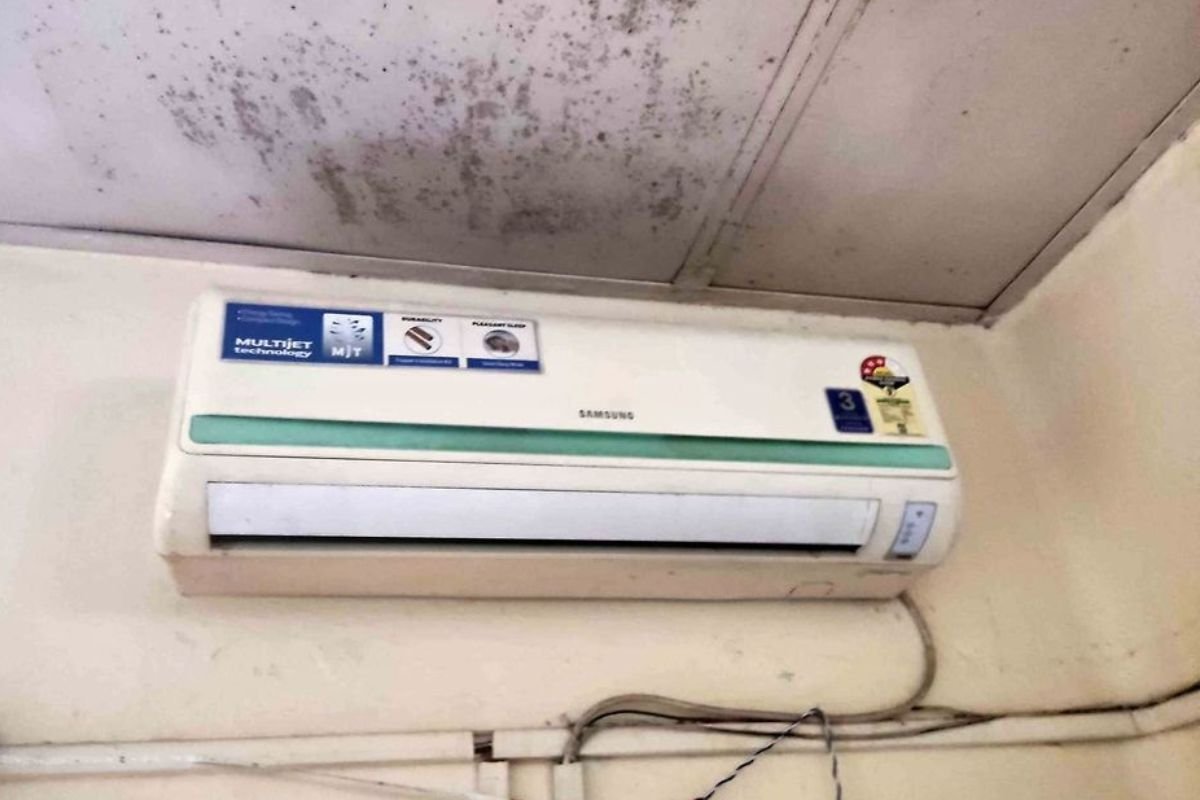
When your air conditioner begins to emit a bad odour, it can turn your comfortable space into an unpleasant one. Often this issue arises when mould or mildew has accumulated within your unit due to moisture, or when the system is not properly ventilated. Keeping your air conditioner clean and well-maintained is key to ensuring fresh air circulates in your home.
Addressing a foul smell promptly can help prevent more serious issues with your air conditioner and ensure it operates efficiently. Whether the pungent odour is musty, reminiscent of sewage, or a sharp, burning scent, identifying the cause is the first step to restoring a clean and odour-free environment. Regular cleaning of filters and checking for blockages in the drainage system are simple and effective ways to tackle unwanted smells.
By understanding the common causes of unpleasant smells emerging from your air conditioner, you can take practical steps to remedy the situation and maintain a clean, fresh atmosphere in your living spaces. Investing time in preventative measures and routine cleaning can go a long way in keeping your air conditioning system smelling fresh and functioning at its best.
Understanding Air Conditioner Smells
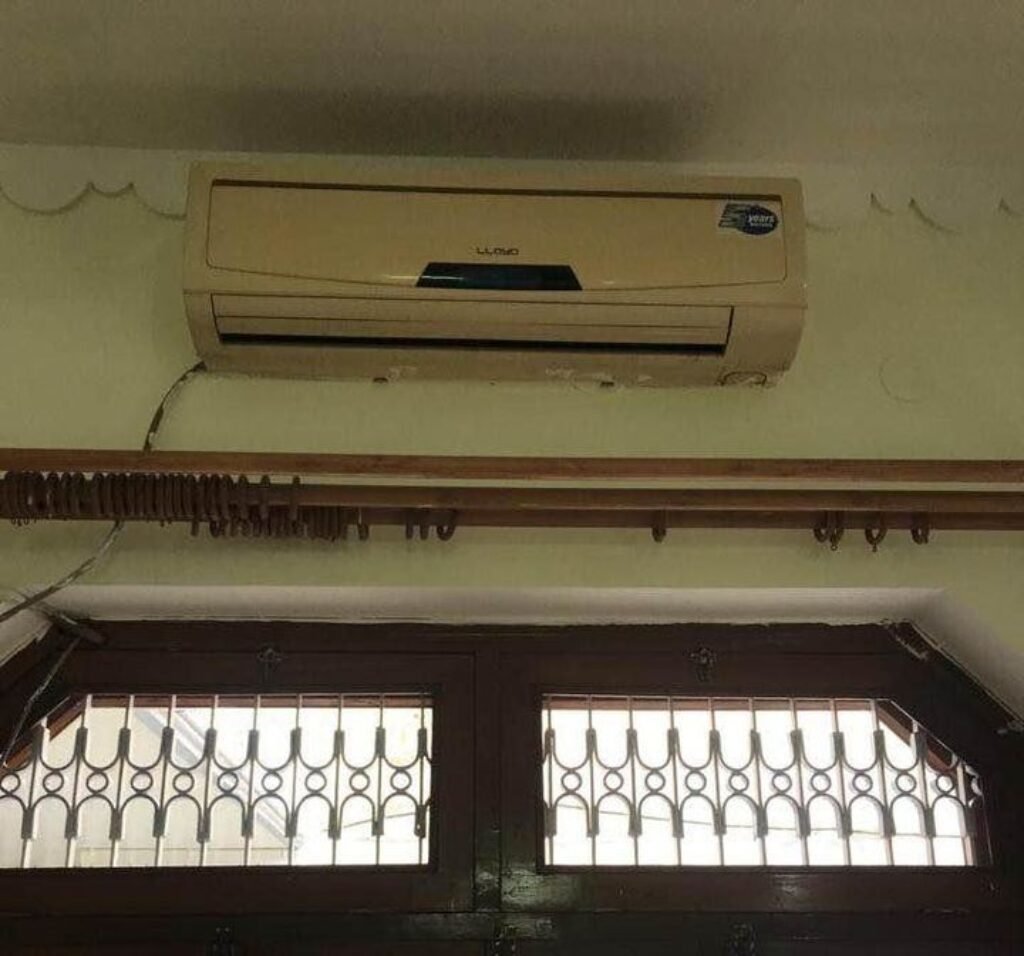
In exploring the causes and implications of odours from your air conditioning, it’s vital to identify the type of smell, understand the root causes, and acknowledge the potential health risks associated with them.
Common Air Conditioner Smells
Your air conditioner can emit a variety of distinctive odours, each indicating a different issue. For instance, a musty scent often suggests the presence of mould or mildew within the system. If you perceive a burning smell, it could be a sign of an electrical fault or overheating components. A chemical smell may hint at leaking refrigerant, while a rotten egg odour could signify a gas leak or decomposing organic matter within the system.
Reasons for Bad Smells
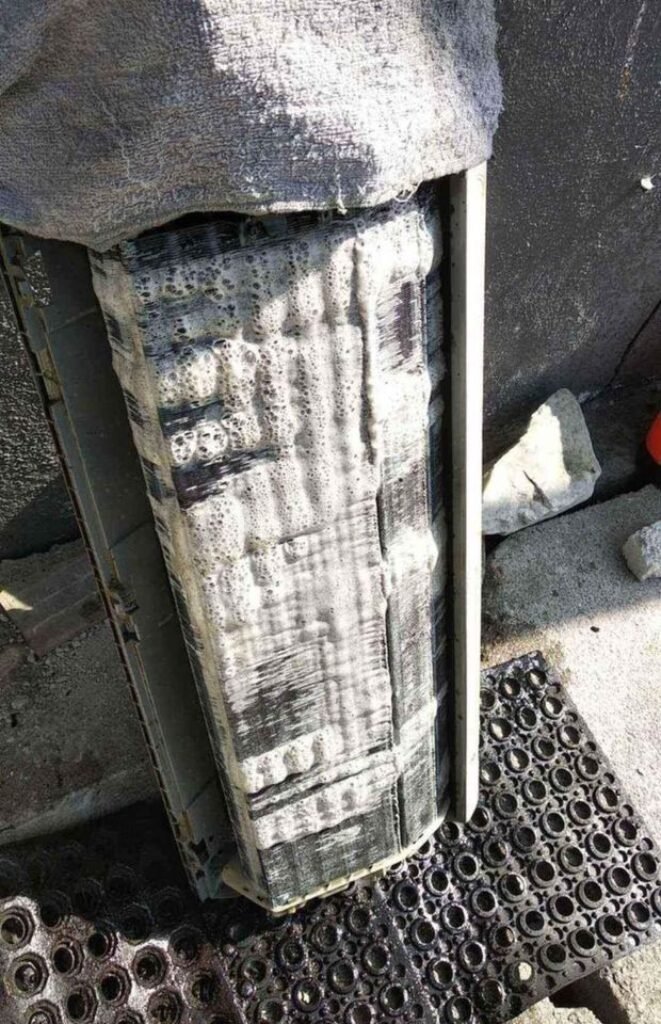
Several factors can cause your AC system to emit unpleasant smells. A dirty air filter can harbour bacteria and mould, which contribute to a musty odour. Stagnant water in the drip pan or a clog in the drain line can create an ideal environment for mould and mildew. Meanwhile, a faulty coil or leak may release harmful chemicals, translating into a distinct chemical smell.
| Issue | Likely Smell | Possible Cause |
|---|---|---|
| Mould and Mildew | Musty | Humidity and stagnant water |
| Electrical Problems | Burning | Overheated components |
| Refrigerant Leak | Chemical | Cooling coils or refrigerant lines |
| Gas Leak or Decay | Rotten Egg | Sulphur compounds or decay |
Health Implications
Bad smells from your AC can affect your indoor air quality and may have implications for your health. Prolonged exposure to mould spores can provoke allergies and respiratory issues. Chemical and gas odours can be especially alarming as they may indicate the presence of toxins. It’s essential to address these odours promptly, potentially with the aid of an air purifier, to mitigate any adverse health effects.
Preventive Measures
Adopting effective preventive measures is crucial in maintaining a fresh atmosphere within your living space. By focusing on routine maintenance and proper usage, you can ensure your air conditioning system remains free of unpleasant odours.
Routine Maintenance
Regularly Replace or Clean the Air Filter: Your AC unit’s air filter is its first line of defence against contaminants. Ensure you check and replace or clean the filter every 1-3 months, depending on usage, to prevent bad smells and maintain clean air.
- Inspect and Clean the Drain Pan and Evaporator Coils: Over time, mould and bacteria can accumulate in the drain pan and on the evaporator coils of your air conditioner. Regular cleaning of these parts is essential to avoid bad smells.
Proper Usage
Use Your AC Wisely: Turning on your air conditioner for short bursts and then switching it off can cause excessive condensation, which may lead to mould growth. Instead, run your AC unit at a consistent, moderate setting to remove heat from the air and control humidity levels.
- Ventilation During Off Seasons: Even when you are not using your AC, it’s important to occasionally turn on your air conditioner to keep air flowing and prevent stale odours from developing. During mild weather, allow fresh air from outside to circulate and help keep the system dry.
Identifying the Source
To effectively eliminate bad smells from your air conditioner, it is vital to pinpoint the origin of the odour. By systematically inspecting specific components, you can identify the cause and address it directly.
Inspecting the Air Filter
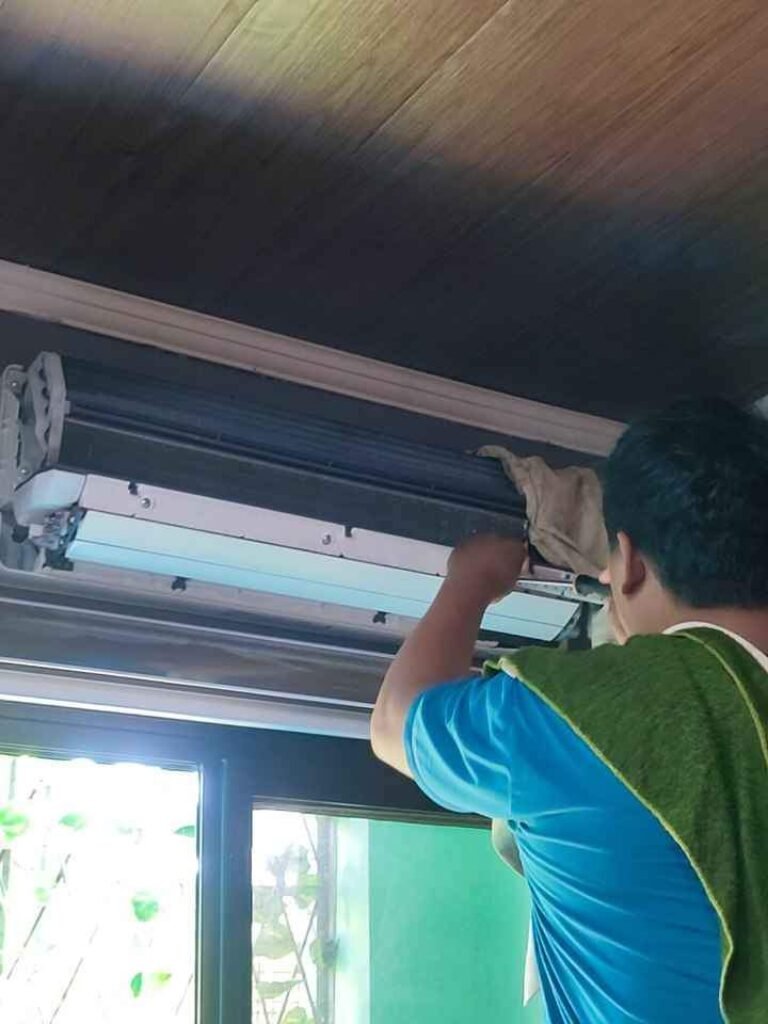
Your air conditioner’s air filter is crucial in maintaining indoor air quality. A dirty air filter not only impedes airflow but can also become a breeding ground for bacteria, which may lead to unpleasant odours. Regularly check and replace the filter to prevent smells from pervading your living space.
Checking the Drain Line
The drain line can often be a culprit for foul smells if there’s a clog. This blockage can cause water to back up, leading to mould and mildew growth. Ensure that the drain line is clear and that water can flow freely away from your indoor unit.
Examining the Evaporator Coil
The evaporator coil absorbs heat from your indoor air, and over time, it can accumulate dirt and mould, producing a smell. It’s important to clean the coils regularly to prevent this, as a clean coil is essential for both efficiency and odour control.
Analyzing Air Ducts
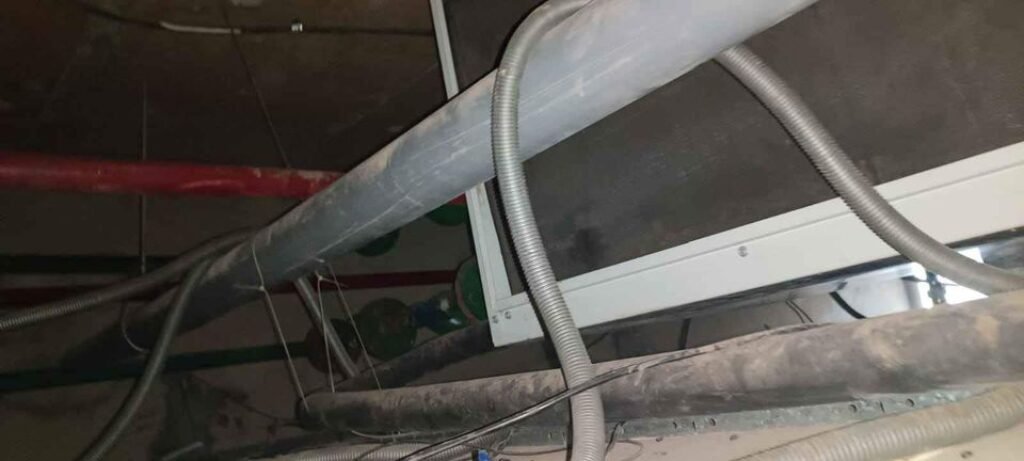
Finally, inspect your air ducts for dust buildup which can harbour odours. If the smell is coming from your air ducts, it may be due to mould or mildew, which thrives in damp environments. A thorough cleaning of the ducts can help eliminate these persistent odours.
Cleaning and Removal
To ensure your air conditioning unit remains a source of clean air and not unpleasant smells, regular cleaning is essential. If a musty AC smell persists, it may be removed by either a thorough cleaning or by seeking the services of a professional.
DIY Cleaning Techniques
When cleaning your air conditioner, start by turning off the power. For a basic clean, remove and clean the filters with warm soapy water, allowing them to air-dry completely before reinstalling. For deeper cleaning, use a brush or vacuum to remove any remaining debris from the vents and coils. If your AC’s drain pan is full or blocked, it could cause mould, so make sure it is clean and clear. This guide explains how to address the drain pan issues.
- Check and Clean Filters: Regularly removing dirt and contaminants.
- Vacuum Vents and Coils: To prevent build-up leading to odours.
- Inspect the Drain Pan: Keep it unclogged and sanitised.
Professional Cleaning Services
Should the smell persist or if you’re unsure how to clean your air conditioner properly, call a professional. A reputable heating and cooling company can provide a comprehensive service that will not only target unwanted smells but also help maintain the unit’s efficiency. Professionals will clean parts you might miss and also check for any potential repairs needed. Professional cleaning services ensure a deeper clean and can be especially beneficial for central air conditioning systems.
- Deep Clean: Access and sanitise internal components.
- Repairs: Identify and fix other potential sources of odours.
- Maintenance: To keep your AC unit running efficiently.
Addressing Persistent Odours
If, after cleaning, an unpleasant smell remains, it may indicate a more serious issue. In some cases, a fungicide or mould inhibitor may need to be applied within the AC system, particularly if mould growth is a problem. For persistent or inexplicable odours, it’s important to consult with a professional who can accurately diagnose and treat the root cause of the smell.
- Mould Inhibitors: To treat and prevent fungus growth.
- Odour Neutralisers: Use as directed to combat stubborn smells.
- Professional Diagnosis: To uncover and rectify underlying issues.
When to Call a Professional
If your residential air conditioning unit is emitting unpleasant odours, it’s often something that can be handled with routine maintenance. However, there are specific instances where only a qualified technician should address the issue. Be aware of the following signs that suggest professional intervention is necessary:
- Persistent Smell: If the smelly air conditioner persists even after changing filters and cleaning the unit, a technician should inspect it for underlying problems.
- Smell of Rotten Eggs: A smell resembling rotten eggs can indicate a gas leak or, in some cases, dead pests within the system. This requires immediate attention from a professional.
- Electrical or Burning Odours: Should the air from your AC end up smelling like burning plastic or other electrical smells, turn off the unit immediately. These scents can signify electrical issues that pose safety risks.
- Mouldy or Musty Scents: While a musty smell often points to mould or mildew, if cleaning doesn’t resolve it, there might be a larger infestation. A technician will accurately diagnose and remedy the issue, ensuring healthy air quality.
Preventing Future Smells
Ensuring your air conditioning system remains smell-free involves proactive measures and consistent upkeep. By adopting a regular maintenance schedule and taking steps to improve indoor air quality, you can prevent unpleasant odours from settling in your system.
Regular Maintenance Schedule
Clean or Replace Filters: Aim to clean the reusable filters or replace disposable ones every three months, or more frequently if you have pets or a dusty environment. This not only prevents bad smells but also maintains airflow and efficiency.
Inspect and Clean the Drain Pan and Drain Line: Make sure the drain pan is emptied and cleaned regularly to prevent mould growth. The drain line should be checked and cleared of any obstructions to ensure proper drainage, reducing the risk of musty odours.
Improving Indoor Air Quality
Use Air Purifiers: Integrating an air purifier into your living space can significantly enhance the quality of new air entering your air conditioning system. Look for models with HEPA filters to capture a wide range of airborne particles.
Control Humidity Levels: Maintain indoor humidity levels between 30-50% to inhibit the growth of mould and mildew. Use a dehumidifier if necessary, especially during warmer, more humid months.
Conclusion
Efficiently addressing bad air conditioner smell can not only enhance the atmosphere of your home but also maintain the air conditioner’s performance. If your air conditioner smells musty, take proactive steps to remedy the situation.
- Regular Maintenance: Ensure that your central air unit undergoes routine maintenance. This includes replacing or cleaning air filters, which can harbour odours and impede airflow.
- Clean Condensate Drain Line: Periodically flushing the drain line prevents blockages that could lead to mildew odours.
- Inspect Coils and Fins: Dirty coils can cause foul smells and affect efficiency. Clean them as recommended by the manufacturer.
- Professional Duct Cleaning: If smells persist, consider professional duct cleaning to remove any hidden mould or debris.
By attending to these areas, you will foster a clean air environment, improving both air quality and system efficiency. Remember, keeping your air conditioner free of odours is essential for a comfortable and healthy living space.






